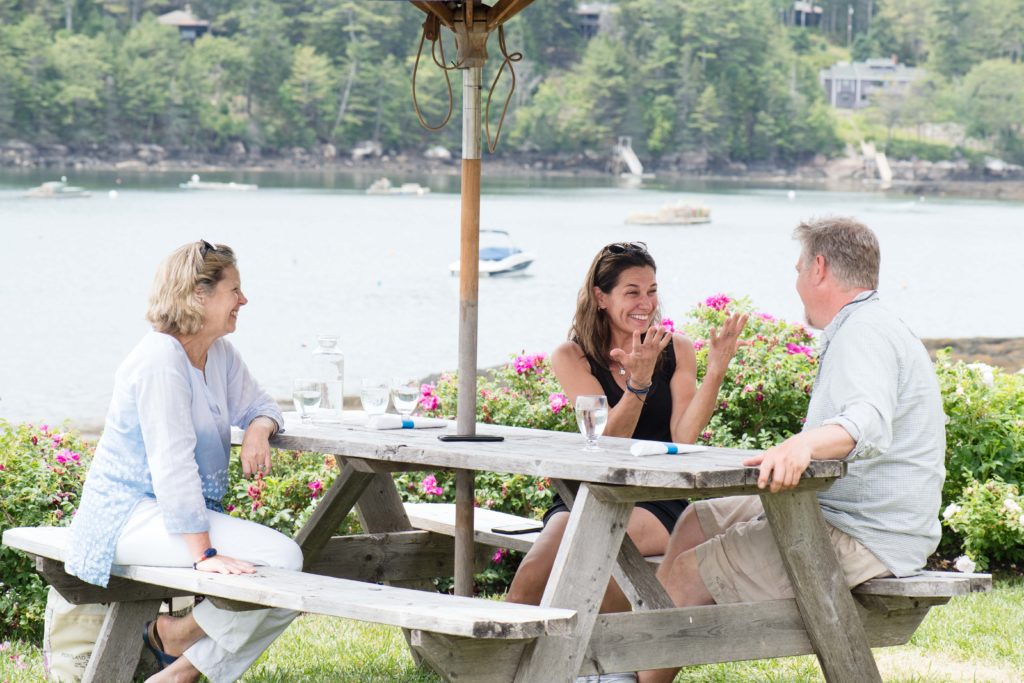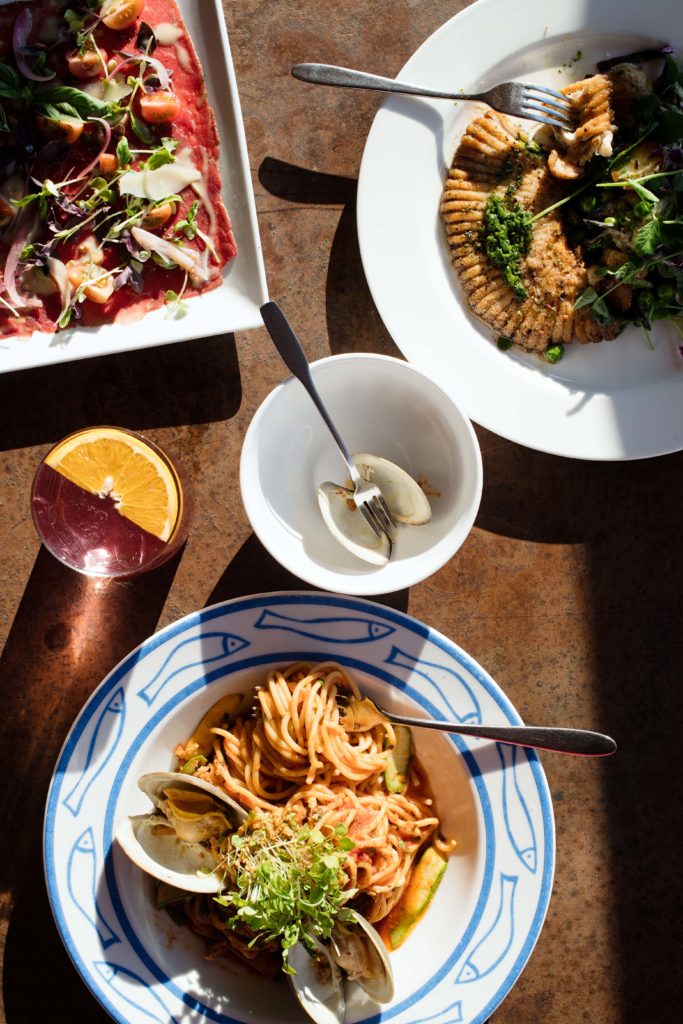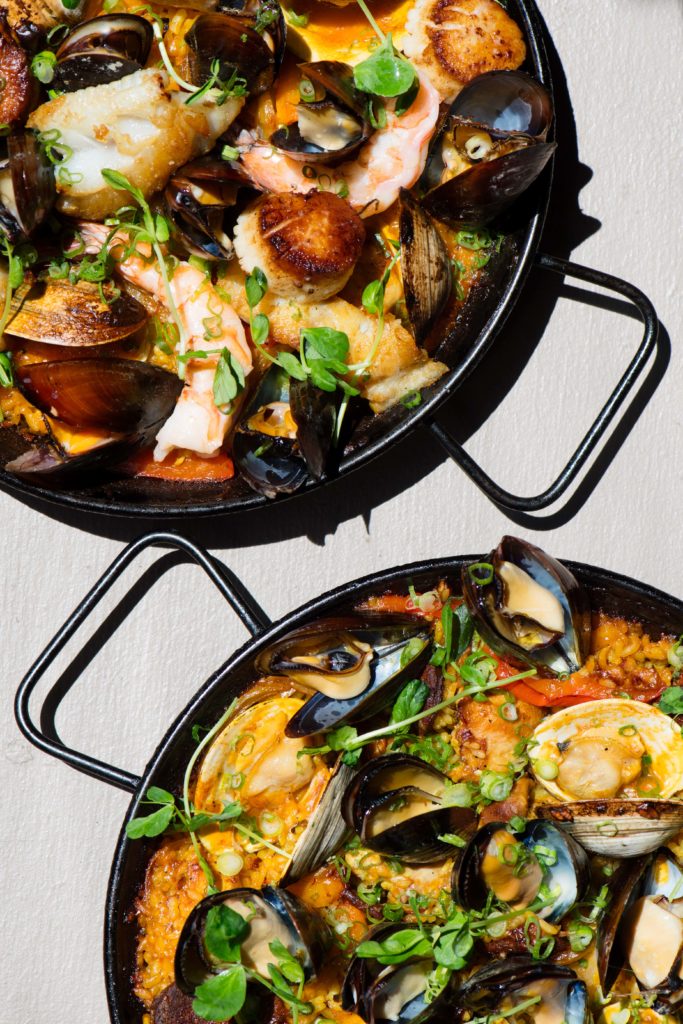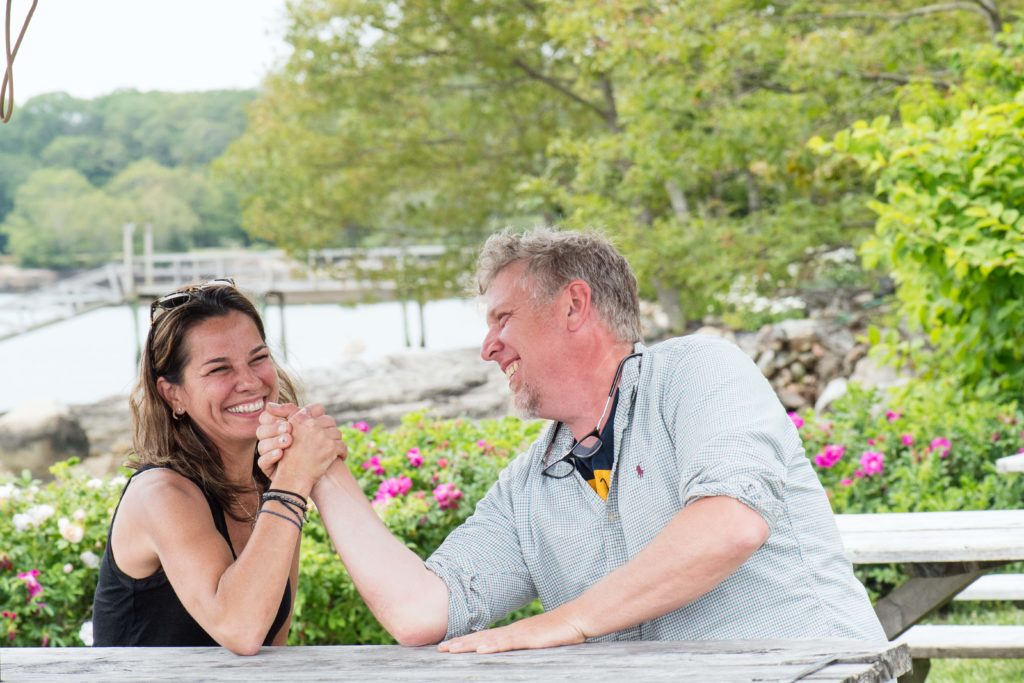Stirring the Pot
A conversation between chefs Melissa Kelly and Jay Villani on food, farming, and 20 years in the restaurant industry in Maine

Melissa Kelly is the chef and owner of Primo in Rockland; she also has licensing agreements for Primo restaurants at hotels in Orlando, Florida, and Tucson, Arizona. 
Jay Villani co-owns three restaurants in Portland: Local 188, Salvage BBQ, and Black Cow.
In 1999, two New York–born chefs opened their first restaurants in Maine. Each was taking a leap of faith well before the state had garnered national culinary clout. Trained at the Culinary Institute of America, Melissa Kelly had just won a James Beard award for Best Chef: Northeast when she left the Old Chatham Sheepherding Company in the Hudson Valley to open Primo in an old Victorian house in Rockland. Jay Villani, a musician, artist, and self-taught chef who had worked his way up through the ranks, brought the original iteration of Local 188 to Portland’s Longfellow Square. Both restaurants are now icons in their communities and beyond, and the chefs have launched other restaurants. Kelly (who won a second James Beard Best Chef: Northeast award in 2013) has outposts of Primo at hotels in Orlando, Florida, and Tucson, Arizona, while Villani has stayed closer to home, opening Sonny’s (now Black Cow) and Salvage BBQ, both in Portland. To mark these restaurateurs’ two decades of success, we invited them to meet, for the first time, over lunch at Linekin Bay Resort in Boothbay Harbor. The following conversation has been edited for clarity and length.

Twenty years ago, and then some

MELISSA KELLY: I grew up in New York, on Long Island, and went to the University of Maine, and then I decided to go to culinary school. Right out of school I worked at the Greenbrier in West Virginia. I met Larry Forgione there, and I worked with him for six, seven years, at An American Place in Manhattan. Then he opened a restaurant in Rhinebeck, New York, and I really started to like that quieter lifestyle. He opened a restaurant in Miami, and I had to go help with it. That restaurant was a nightmare. I ended up moving to San Francisco, and then Old Chatham Sheepherding Company came up. It was a dream job as a young chef, because the owners were wealthy, and they wanted to make it a very successful place. So whatever I wanted—a smokehouse, a greenhouse—they did it. I stayed there for five-and-a half years, but after a while, it felt like it had no soul to me because everything came so easily. And they wanted me to tie string beans with a chive and things like that.
JAY VILLANI: You can do that?
KELLY: I can’t! Do you see these hands? I don’t use tweezers; it’s not my style. My business partner, Price [Kushner], and I both had connections in Maine, so we started looking here. It just seemed like a place where it was affordable to buy something, and I could have land, like I wanted. I figured we would try it, and if it didn’t work out we could go somewhere else. But here I am, 20 years later.
VILLANI: I’m also from New York, a Staten Island boy (don’t let anyone know that, please). After my parents split I lived with my dad. My mom was in New Hampshire; after my sophomore year in high school, I went to visit and never went back. I got a job washing dishes; I was a guitar player and didn’t know really what I wanted to do. When I graduated high school, I moved back to Manhattan and got a job barbacking and busing in a nightclub on Staten Island. And I tried to pursue art and music. One day a dishwasher didn’t show up, so I started washing dishes for a cafe. And then one day a salad kid didn’t show up, and I started making salads. Then a grill guy, and I thought, “You mean I don’t have to wash dishes; I could do this instead?” And then I started applying for jobs that were way over my head. I remember the first day a chef at Walker’s cafe in Tribeca threw a salmon in front of me and says, “Okay, here you go. You got all this salmon you need to cut.
KELLY: And we didn’t have Google.
VILLANI: But I knew a little Spanish. I had Dominican and Puerto Rican prep cooks who showed me how to do it, and that’s how I learned.
I worked in some good places. I worked at Coco Pazzo, but it went downhill quickly for me there because I didn’t listen. I expedited lunch one day and the chef, Mark Strausman, told me to go home after lunch, but the guy who was coming in said, “Well, do you want to stay on a little longer?” And I was a little full of myself so I said, “Yeah, I can do this.” I had Portuguese busboys yelling at me, Mexican line cooks yelling at me, and a French lady maître d’ yelling at me. And by the end of the shift, this big Texan comes busting into the kitchen and asking for the chef, saying he had been eating there for years and everything was terrible. I didn’t even show up the next day.

A friend of mine said, “Well, you’re an artist, right? Why don’t you come up to New Haven with me, and I’ll get you a job at the opera house, at the Yale Repertory Theatre, painting sets.” So I went up there and painted sets for a little bit, and at the end of that season they asked me to come out for the summer to New Mexico and paint sets at the Santa Fe Opera. I met my wife, Allison, out there; she got accepted to graduate school in New York, so it was a no-brainer to move back. And I started the whole process again, just bouncing in and out of kitchens. We moved to Portland, and I got tired of working for other people, and so that’s when we opened the first Local 188. It started as a gallery; my wife’s a ceramicist, I was a steel sculptor, and we picked the location on Longfellow Square because Cafe Uffa had a line out the door all the time. And we thought maybe we could get them to come in, buy a little beer or wine and a piece of artwork. No one was really doing tapas, and it kind of snowballed from there. I eventually threw paella and chorizo on the menu, and people would say, “I really wanted a cocktail.” So we got a liquor license. We moved over to the big space on Congress Street and the first night we did 350 covers, and I didn’t know what I got myself into. I definitely have achieved more than I should have in the industry, for not knowing what the hell I was doing.
KELLY: Sounds like you earned it.
VILLANI: I drew my original plans for Local 188 on a paper napkin for the guy down at Portland City Hall. I paid my 35 bucks, they stamped it, and I was off and running. I pulled my original hood out of the Burger King on Monument Square before they demoed it. It’s kind of crazy at this point; Portland has just blown up. I think it’s great—all boats rise with the tide. But there was a time when I could predict how many covers we were going to do, and now it’s kind of like a roller coaster; it’s up, it’s down. People think it’s easy, which is the part that I don’t get. I’m not going to belittle anyone chasing their dreams, but it’s not an easy row to hoe.
KELLY: Rockland’s like the Hamptons now, but when we opened Primo, it was pretty defunct. Almost every store on Main Street was empty. There was the Rockland Cafe and Rock City Coffee, and a variety store that had a naughty section in the back.
Right people, right stuff
VILLANI: I could work 50, 60, 70 hours a week and not bend, just do what needs to be done. And all of a sudden my son was ten and my daughter was eight and I never saw them. I made a conscious decision about seven years ago to spend more time at home, and that’s when it really clicked for me, just hiring the right people—people who are hungry, people who are talented—and just giving them the tools and treating them well. I started giving people health insurance ten years ago. Hopefully it’s a symbiotic relationship that goes both ways. And now I’m more into just helping with menus and developing and asking them, What do you need? “Chef, dishwasher didn’t show up.” Okay, I’ll be right there. I like cooking brunches on the weekend; I’m a really good egg cook.

KELLY: I’ve always taken culinary students in the summer because it works out really well. Their externship is five months, which works through my season. Ten years ago, a friend of mine who was the dean at the Culinary Institute of America (CIA) moved to Singapore to help start the CIA there. They only have one class a year of about 45 kids, but they all go out on externships at the same time, and it’s always in May, which is perfect timing for me. They want to learn, and they’re fun, and they make delicious family meals. I’m just totally in love with them, and they’re a good example for the not-so-perfect cooks.
VILLANI: You’ve got to be willing to listen, and placate. I’m like head camp counselor, these days.
KELLY: You’re everything: a doctor, a psychologist, cook, maintenance man, plumber.
VILLANI: “Chef, the return air’s not working, who do we call?” Oh, well you just called me.
KELLY: At the hotel in Orlando, they’re always bitching about engineering: “They’ve got to change the light bulb.” What? You call engineering to change a light bulb? Are you kidding me? I’m YouTubing how to fix the toilet bowl…
VILLANI: That’s how you do it. I’m the fix-it man. I fix everything.
As if one restaurant isn’t enough
KELLY: My other two restaurants are both in hotels, and it’s a licensing agreement. So I basically just manage them. I write the menu and instill the culture. I hire the manager, the chef, and they come up here and work with me and I go there and spend time with them. I’ve been in Orlando for 16 years and for 13 in Tucson. I love Tucson. I don’t love Orlando, but I’ve built a community of friends there from when I first opened. My original chef has gone off and opened her restaurant downtown. My original sous chef now has five restaurants, and my original front-of-the-house manager has five restaurants. They’ve changed the whole scene in Orlando. It was junk when I got there.
VILLANI: If I was to do it again, I’d just stick with barbecue. It has such a wide appeal; people actually travel for good barbecue. Before we opened Salvage, we did barbecue tours. We went through the South, through Texas, and did the whole corridor up from Memphis, St. Louis, Kansas City. When you actually start smoking meat and figuring it out, it’s nerve-wracking. Because 12 hours or 14 hours later, if you’ve screwed it up, it’s not like I could cook another piece of fish on the fly. It’s very fundamental, it’s elemental, it’s primal, and it taught me a foundation that I didn’t have before—why stuff is happening when you’re cooking.
KELLY: One of my students from Singapore loves barbecue. When he was here a few years ago he wanted to eat everywhere and learn. He would go every Tuesday to your place to eat and bring back barbecue; he had barbecue in his freezer. He’s working in Texas now, and he’s going to go back to Singapore eventually. Barbecue is his mission.
Other people’s food
KELLY: My mom cooks every day. I mean she cooks. And I go to her house once in a while and cook with her, and she says, “You use every single pot and pan and spoon in the whole place.” I don’t think about it because I’m usually just throwing into the dish station. I never cook at home.
VILLANI: Me either, much to my wife’s chagrin. I keep telling her that I’ve been washing dishes all day; I don’t want to come home and wash more dishes.
KELLY: I remember growing up and traveling, and I marked places with food. You go to New Orleans, you get that flavor, you go to the Pacific Northwest, you have those flavors, you come to Maine, you have lobster and scallops. Now you have everything everywhere, and that’s disappointing for me. On my Tuesdays off, I go to a lobster pound, usually McLoons in South Thomaston. In Rockland, Sammy’s Deluxe is probably my favorite place. He’s just a down-to-earth, nice person, and he’s a good cook.
VILLANI: I go to Sapporo in Portland. My kids grew up in that restaurant, and Yoshi (he no longer owns it, he’s back in Japan now) was the first restaurateur in town to ever buy me a beer. I don’t really go out to many other places. I’m either too busy or it’s just not my cup of tea.
Chickens and pigs and cakes…oh my

KELLY: I had to get new chickens this year—every couple of years we get new laying hens. They’re hard to find because I want them ready to lay when we open, so they have to be 16 or 18 weeks old. I found them finally in Pennsylvania, and I thought they were just going to deliver them to me, but no. They wanted me to pick them up. And it was opening week of the restaurant, and I said, They’re going to be in crates, right? “No, you have to have your own crates, for 200 birds.” So I ended up finding a retired truck driver to go get them, and we made the crates out of lobster crates.
And then we have pigs, ducks, guinea hens, and bees. My mother can’t believe that I raise animals to serve in my restaurant, because I originally was going to be a veterinarian. But you have so much control and you get so many value-added products that people don’t ever see. You get a plant when it’s a shoot and when it goes to seed, and with the chickens and the pigs it’s such a circle. They eat all of our waste from the restaurant–everything gets composted or fed to the animals—and then it goes back, and there’s not one piece of anything that goes to waste. When I go to the hotels in Orlando, or Tucson, and they’re doing banquets, they waste so much food and I have such a hard time with it. We have new owners in Orlando, and they want to try and up the game there, so I’m hoping I can help with that.
The pigs come to me at eight weeks old, and we keep them in a small pen when they’re tiny, just so we can keep track of them. And then when they get comfortable and decimate that pen, we move them over into the woods. Once they dug under the fence. But they didn’t go anywhere; they just went into the garden and started eating. And then they went to sleep, right there in the middle of the garden. We had to go get chocolate budino cakes to lure them back into their pen.
VILLANI: That always works for me.
KELLY: One time we had a wedding and somehow the cake order got screwed up and they made the wrong-flavored cake. They had to make a second cake, so we had an extra wedding cake, and we asked the bride, do you want to do a photo shoot in the pig pen and feed that cake to the pigs? She said no, so I did it.
VILLANI: That sounds awesome.
KELLY: I had an old, really ugly bridesmaid’s dress that I had to spend a lot of money on. I went in holding this three-tiered wedding cake and they mauled me. The color of the dress was called dreamsicle, a peach color, and it was covered in mud.
What’s Next?

VILLANI: What would excite me is going maybe out of the country and working inother kitchens—three, four weeks here; three, four weeks there. My son’s leaving for college in a few weeks, and then I’ve got three more years left with my daughter. I think once she’s out of the house, taking the barbecue on the road would probably be my next goal. And then there’s always the fish shack in the Caribbean. I don’t need much. I keep telling my wife Puerto Rico seems like a nice place for me to finish out my tenure on this planet.
KELLY: I’m waiting to have a perfect day. That’s my goal; that’s what drives me. Where nothing breaks, no one calls in sick, everyone’s happy. And then I’m going to Sicily. I’m going to have a little card table and wear a housedress, and I’m going to fillet anchovies and sell them on the side of the road. I saw this woman years ago in Sicily, and she just was so happy, she was talking to everyone, she was just filleting fish with the little card table. That’s my plan.
VILLANI: This was plan C for me, and I’m very, very blessed that it worked out. I was involved in a lot of art, a lot of music as a young man, and kitchen work was just a way for me to pay the rent.
KELLY: That kind of goes hand-in-hand, that lifestyle, working nights, not having a normal life.
VILLANI: I kind of found my people, my family so to speak, working in kitchens.
KELLY: I love the energy of the restaurant community. We’re a different breed.



